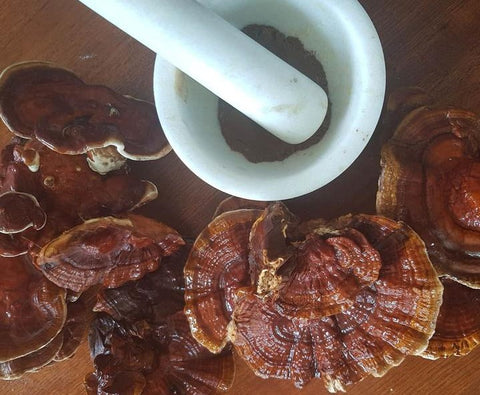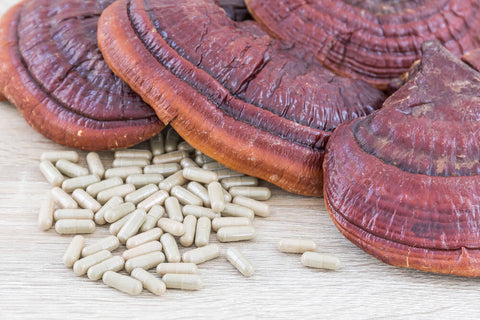Mushrooms for mood
Medicinal mushrooms come with a rather impressive resume.
Many of the strains we see today are backed by several studies that support their potential to increase immunity, reduce inflammation, protect against disease, and improve overall wellbeing.
But here’s where it gets even more exciting. Amongst the thousands of different types of mushrooms, each one boasts its own unique range of benefits.
And today, we’re talking about mushrooms for mood, stress and anxiety.
Adaptogenic mushrooms — if you will.
So, which mushrooms are good for mood? And how exactly do they do it?
Which mushrooms are good for mood?
Before we dive into our favourite mushrooms for mood, we need to chat about adaptogens.
So, the word ‘adaptogenic’ refers to any herb or plant that helps to improve our resistance to physical, emotional, environmental, chemical and biological stressors. Not only do they help us cope with immediate stress, but when taken moderately, they may help our bodies regulate our general response to stress and anxiety.
See, the body’s stress response is complex and involves multiple bodily systems, with the main stress response system called the hypothalamic-pituitary-adrenal axis. Now, that’s a bit of a mouthful so we’re just going to call it the HPA axis.
So, allow us to get a little science-y: the main job of the HPA axis is to release hormones that activate the stress response (called glucocorticoids). And, adaptogens influence the HPA axis (and other stress response systems) by “hacking” the way the body responds to the stress. Typically, when our bodies feel stress, we go through three stages:
- The alarm phase (when your body becomes alerted to the stressor)
- The resistance phase (the bodily response to help resist the stressor), and
- The exhaustion phase (when the body fatigues after experiencing the stressor)
So, adaptogens work to prolong the resistance phase and encourage the body to achieve homeostasis (or stability) when responding to stress.
Rather than a quick fix (and we all know that quick fixes don’t work) adaptogens are in it for the long haul.
So, it’s time to meet our three favourite apoptogenic mushrooms for mood…

Reishi for mood
We can’t talk about stress relief and not mention Reishi — the mushroom traditionally known as “the supreme protector.” Best known for its calming and stress-reducing qualities, Reishi is packed with antioxidants and compounds that help the body manage stress in a variety of ways.
See, when you’re feeling anxious and jittery, it’s usually due to an increase of cortisol in your body. And after a particularly stressful day, your cortisol levels might be even more elevated.
Not only does Reishi help to lower high cortisol levels, but it may also help manage stress responses through something called polypeptides. These polypeptides team up with the endorphins and neurotransmitters in your brain, often having a relaxing effect on the central nervous system.
But it’s not just stress and anxiety that Reishi helps with — Reishi may also alleviate insomnia. Ever had a night where it felt like your brain just wouldn’t turn off? Well, Reishi works kind of like a nerve tonic that eases the alarm signal from reaching the brain. Good-bye intrusive thoughts, hello peaceful sleep!
As with anything, moderation and consistency are key. Due to Reishi’s harmonising effect, the benefits of the mushroom are best achieved as a slow burn. Instead of abruptly forcing the body from one physiological state into another, Reishi works to bring the body into homeostasis or self-regulation (a state that can be difficult for the body to achieve).
So, when we take Reishi consistently over longer periods, the mushroom can actually regulate the physiological functions based on the specific individual. That is, if someone has a tendency to feel stressed or anxious, Reishi may calm the body and mind by regulating the stress response. At the same time though, if someone tends to experience depression or fatigue, Reishi may boost mood and increase energy.

Lion’s Mane for mood
A little shaggy and unkempt, Lion’s Mane looks like something straight outta Dr Suess. But despite its silly appearance, it’s definitely something to take seriously.
This unique looking mushroom is best known for its ability to improve cognitive function, but it doesn’t stop there. Studies have suggested that Lion’s Mane can exert strong anti-inflammatory effects, and even go as far to help stimulate nerve growth, cell growth and cell renewal. This is thought to help enhance the hippocampus function — the spot in the brain that’s in charge of managing emotions and memories.
Lion’s Mane has also been found to encourage better blood flow, which provides your body with more oxygen. This, of course, includes the brain. And what happens when the brain gets more oxygen? It performs significantly better, and as a result, helps to improve focus, mood and emotional regulation (particularly in managing various states of anxiety and stress).
In 2010, a 4-week study investigated a group of 30 women experiencing anxiety and depression. [1] The women were split into two groups, with the treatment group receiving Lion’s Mane cookies each day (mmmmm cookies) and the control group receiving just regular cookies (still, mmmm cookies). At the end of the study, the participants in the treatment group recorded an overall improvement in mood and sleep quality, and reduction in stress reactions including heart palpitations, frustration, irritability and anxiety — which couldn’t be said for the control group.
It’s important to note: At this stage, there have been few human studies on the effects of Lion’s Mane on stress and anxiety. But we can’t help but feel optimistic on the results of the studies that have been done.
Cordyceps for mood
Have you ever experienced a stressful day, only for it to be followed by an almost debilitating sense of fatigue? Well, that’s because anxiety and stress put our nervous systems into overdrive, increasing our heart rate, blood pressure, muscle tension and inflammation. This is where Cordyceps can help.
Cordyceps is known as a “deep energy awakener” with the ability to restore energy after times of over-exertion, fatigue and stress. One of the mushroom’s biggest claims to fame is its production of the molecule Adenosine Triphosphate, or ATP.
ATP is our body’s main energy supply source, and we need it to fuel our muscles and keep us moving throughout the day. Recent studies have even linked healthy ATP levels and cellular energy as key to managing stress and anxiety, so it’s no wonder that Cordyceps can help produce antidepressant effects. Its slow-burning energy can help to combat fatigue (a common symptom of depression) as well as boost memory and increase libido — win!
Lastly, Cordyceps is an adaptogen, which means it can support the body when dealing with stress. Studies have shown that Cordyceps can help stimulate the adrenal glands and regulate the nervous system, which may work to alleviate stress and reduce feelings of anxiety.
Want to try Reishi, Lion’s Mane or Cordyceps for yourself?
At Natura Mushrooms, we grow, harvest and source a range of medicinal mushrooms on our 100% off-grid farm in Gippsland, Victoria. Then, we delicately extract them using a combination of hot water extraction and dual extraction methods.
Discover our…
- Reishi Extract
- Reishi Powder
- Lion’s Mane Extract
- Lion’s Mane Powder
- Cordyceps Extract
- Cordyceps Powder
Not sure where to start? Check out our mushroom purchasing guide to find the shroom that’s right for you.

REFERENCES:
- https://pubmed.ncbi.nlm.nih.gov/20834180/
- https://academic.oup.com/cdn/article/4/Supplement_2/1212/5845080
- https://www.healthline.com/health/adaptogenic-herbs#effectiveness
- https://www.healthline.com/nutrition/cordyceps-benefits
- https://www.mdpi.com/2227-9032/8/4/520
- https://www.dl.begellhouse.com/journals/708ae68d64b17c52,7b35b5ed6bb0a817,2c53560e0cbb691f.html
- https://www.ncbi.nlm.nih.gov/pmc/articles/PMC3991026/
